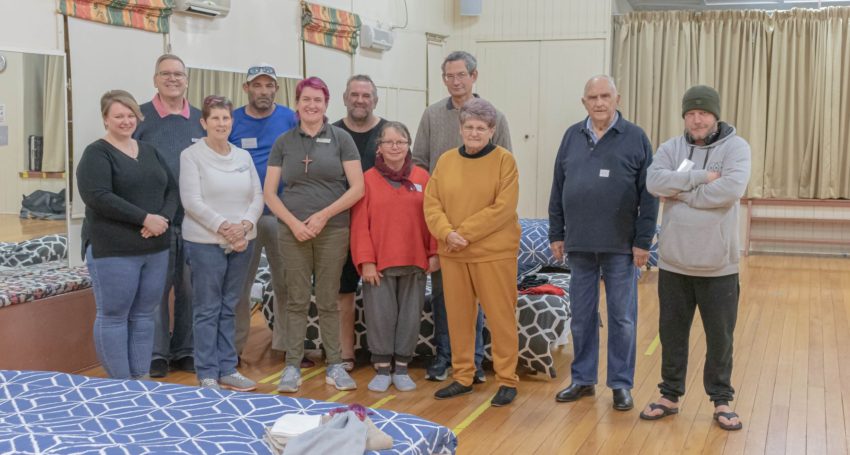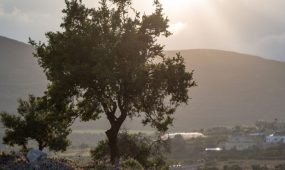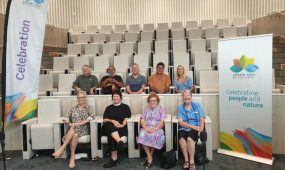From living on Christchurch’s streets to helping those living on Toowoomba’s
Features
“My own experience being homeless, hungry and cold for six months in my mid-teens has helped me to empathise with those doing it tough on the streets…We opened our Winter Shelter in the parish hall in early June to provide a safe haven at night for people sleeping rough,” says The Rev’d Pauline Harley from the Parish of Toowoomba West, as Homelessness Week approaches in the first week of August

Story Timeline
Creating communities of care
- Hero priests or communities of care?
- ‘Bums off seats’: creating a community of care
- Raising up the leaders of today and tomorrow
- The mission of the Church and communities of care
- Building networks of parishioners
- Our op shop: another door to our church
- Blessing and building the North Lakes community
- Making and maturing disciples of Jesus
- The art of deep listening
I grew up in a dysfunctional family and ended up on the streets at 15 years of age in Christchurch for six months in the late 1980s, leading me to leave school early. Being so young, I was incredibly naïve and inexperienced and had no idea what I would be in for. I slept behind dumpsters in various alleyways to keep myself safe.
My mum threw me out of home under the influence of her boyfriend at the time. She had undiagnosed mental health issues caused by severe trauma in her teen years which was dismissed by her family and consequently never dealt with. This led to multiple addictions, her propensity to jump from boyfriend to boyfriend who were largely violent, an inability to care for her children’s most basic needs and compulsive behaviours.
I grew up in an unchurched family, but found administrative work in an Anglican church in Nerang in my late 20s after moving to Australia. The parish priest of St Margaret’s, Nerang at the time, The Rev’d David Cox, recognised that I was frightened and traumatised. His gentle and caring pastoral care over a number of years helped to heal me and led me to seek professional help. After several years, I started going to Sunday services with my children, and was ordained in my early 40s. Since 2019 I have been serving as Priest-in-Charge of the Parish of Toowoomba West.
My own experience being homeless, hungry and cold for six months in my mid-teens has helped me to empathise with those doing it tough on the streets.
We opened our Winter Shelter in the parish hall in early June to provide a safe haven at night for people sleeping rough. The shelter is more than a warm bed, as it provides connection and community because the guests get to enjoy dinner by sitting down with others as families do, as well as engage in non-judgemental conversation and activities and games. Those who have trouble sleeping due to trauma, can get up at night to chat to someone who will listen and care.
Advertisement
I am told by guests in our parish Winter Shelter that passers-by often assume that they are “meth heads or alcoholics” or “lazy”, and are sometimes rebuked by those walking by with, “Go and get a job!”
Homelessness is complex and difficult for people, who have led relatively stable and privileged lives or have had little to do with people sleeping rough, to understand. I also sometimes find that ‘misconceptions’ are conveniently created by Christians who want to be ‘let off the hook’ – by rewriting the narrative that people sleeping on the streets are “lazy meth heads who should just go and get a job,” passers-by absolve themselves from having to do anything. I get frustrated when I hear well-off Christians say things like, “We don’t have homelessness on our side of town”, and using this as an excuse not to help those who are vulnerable.
We recently had a woman who is 36-weeks pregnant sleep in the shelter. She was worried that her baby, once born, would be taken from her because she was experiencing homelessness, so alternative accommodation has been arranged for her.
Another person who stayed in our shelter recently was an elderly man who had rented the same house for over 20 years. After the house was unexpectedly sold, he was unable to find affordable accommodation. Following a month living on the streets, he was able to find a new place to rent.
Advertisement
Affordable housing is a key contributor to homelessness, along with domestic and family violence, lack of employment and marriage breakdown. While the fastest growing demographic of people experiencing homelessness is single women over the age of 55, women are often reluctant to come to a shelter, in part due to the shame associated with not having a home.
Forty Toowoomba West parishioners have completed one-day training with Lifeline in order to volunteer at the shelter. They have taken on a variety of roles, including cooking, welcoming and chatting with guests, making beds, staying overnight to be a listening ear, cooking breakfast, preparing packed lunches and packing up beds.
There are around 10-12 other parishioners who volunteer offsite by washing the linen and towels, cooking desserts and baking biscuits, collecting toiletries for guests’ packs and lovingly sewing fabric bags for care packages.
By serving in this way, parishioners are living the Gospel call to love their neighbour and welcome the stranger. They were inspired after engaging in a parish Bible study in Lent this year, which was prepared by Bishop Jeremy. The Bible study was called Head, Heart and Hands: Practising Faith Today, and over 70 parishioners met in small groups to do this Lenten study. Coming out of the Bible study, parishioners were keen to use their hands and do something practical for their neighbour as an expression of their faith. The Bible study explored taking risks for one’s faith and acknowledging that a lived faith has a cost for the individual and their respective faith community.
The ‘Winter Shelter Toowoomba’ operates under the auspices of Lifeline Darling Downs in South West Queensland Ltd, alongside seven other churches of different denominations. Our shelter is open on Saturday nights, with other churches each providing a given night during the winter months. Toowoomba West parishioners not only volunteer at their own shelter, but also at the shelters in the halls of other denominations.
The model we use is the Christian ‘Stable One Winter Shelter Network’ model. The mission of Stable One is to:
“…support the Church as it works together to share the love of God by providing accommodation to those in need. To journey with each person towards stability, offering physical and spiritual care.”
A number of our priests have reached out to me to find out how they can possibly set up a similar Winter Shelter in other parts of our Diocese. People are welcome to contact me for an initial chat, as well as to contact Stable One, which is based in Victoria. Feel free to email me if you would like to find out more.
Top 10 tips for setting up your own Winter Shelter:
- Educate your faith community through Bible studies, homilies, social media posts and newsletters about the causes of homelessness and how people can help.
- Select a proven model to base your shelter on, such as the Stable One model.
- Connect with an organisation like Lifeline, who can assist with administration, volunteer training and logistics.
- In the enquiring stages, ensure you check in with staff based in St Martin’s House on Ann St, such as regarding insurance and workplace health and safety to seek any required advice and guidance; your Regional Bishop; and, partnering organisations (we had to have a building assessment done by an independent builder for Lifeline).
- To make your shelter sustainable, connect with other churches in your area, so each church offers a place for people to stay on a given night per week during the winter months.
- Ensure that your volunteers are trained in the necessary areas, including regarding Diocesan volunteer requirements, COVID-19 training and any training required by partnering organisations.
- Ensure your volunteers are given the pastoral care and prayer support they need to serve.
- Offer opportunities for people in your faith community to volunteer both onsite at the shelter and offsite behind the scenes.
- Get word out about your shelter through social media channels and the media.
- Talk to other priests in our Diocese to find out what works and what doesn’t work and to share ideas.





